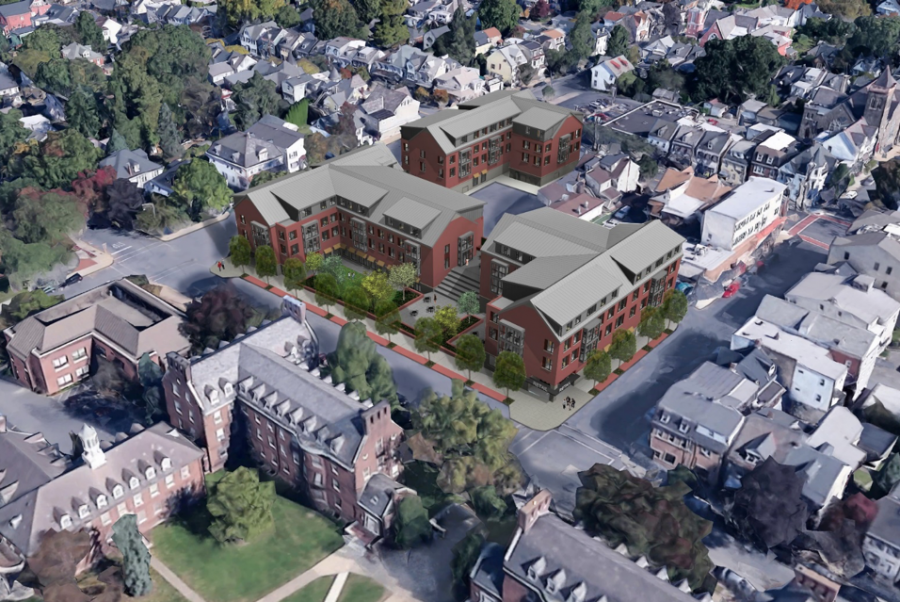The Easton Planning Commission capped off a six-hour meeting with a 3-2 vote against recommending the college’s proposed zoning amendment for its expansion.
The college came to the meeting with two proposals: the plans for modular housing on the March Field parking lots and the changes to the zoning amendment. The planning commission voted unanimously to recommend the plans for modular housing to City Council with the condition that they should be removed three years from the date of completion of construction.
One member of the planning commission recused herself from the vote.
Lafayette proposed raising the building height limit from 40 ft. to 55 ft. and allowing buildings to use up 85 percent of their lot, up from 50 percent. The city asked the college to reconsider their proposals in February, and the college added a proposal to change from asking for permitted use to special exception.
According to Vice President of Finance Roger Demareski, special exception will allow for more input from the community, and this modification is an example of the collaboration between the college and the city.
“What we came to understand is that the special exception allows you as a board to hear more specifics about exactly what would happen in terms of a development,” he said. “It gives you another look at exactly what were thinking about.”
Proposed zoning changes would allow the college’s current expansion and construction plan for the new dormitories on McCartney Street. Easton residents and members of the commission questioned the plans.
Residents asked where the campus’s edge will stop if the expansion ensues, and how it affects the neighborhood historic value.
“Why should the city of Easton stop protecting the very good zoning laws we already have, stop preserving historic architecture, and stop valuing sustainability and affordable housing,” College Hill resident Peggy Palmer said. “Why should we grant spot-zoning t0 Lafayette College because they have a wish list?”
“They don’t want dorms on their campus, they have said this,” Palmer added. “But we don’t want dorms in our neighborhood.”
Commissioner Ron Shipman, who lives on College Hill, disagreed with opinions expressed by other members of the community and supports the college’s expansion plan.
“There’s another side to this, and I’m very sorry, but I can’t vote against this project,” Shipman said. “I think it’s a first-class project, I think it’s going to improve the neighborhood.”
This statement led to heated discussion between community members in the audience and Shipman.
The Village on College Hill’s liaison to the college Paul Felder said that all of the college’s requests were problematic.
“What the precedent they’re asking you to set and the city council to set is we take a preexisting, nonconforming use and instead of zoning to make the next use better, we rezone things so that every subsequent use can be worse,” Felder said.
Former Mayor of Easton and College Hill resident Phil Mitman presented a map of Lafayette’s properties on College Hill both inside and outside the proposed zoning changes.
“There’s about seven to 10 acres of land down there [near the Bushkill campus] which could be built upon, and I would suggest that that would be a better use than in this national registered historic district here,” Mitman said.
Later, in response to this suggestion, Demareski said that although the Bushkill site might be a viable site to put students in 10 or 15 years, as of now it is not.
Commissioner Robert Sun, however, said that he felt Mitman’s map said much more about the future intentions of the college.
“We’ve heard about properties being bought off by the college, but now that you see it visually it’s clear exactly what the game plan is,” Sun said. “The game plan is to continue to expand.”
At the end of the meeting, Demareski was asked to explain what the college plans to do with all the properties they own and why they have them.
“The prime reason is that we have a demand for faculty, student and staff rentals,” he said. “We use it at a tool to recruit junior faculty.”
When asked whether the college has plans to tear down other college-owned properties in the future, Demareski said that further expansion was not expected in the next 10 years, but that he could not guarantee that it would not be considered in the future.
Despite the college’s responses, several community members held strongly to their beliefs against the expansion, a sentiment felt in the applause following the vote by the planning committee.
“I think the concern with the citizens is that there’s not enough transparency about this whole process,” Commissioner Bill Carr said.
Sun echoes Carr’s concern for the citizens, and feels that the college’s request shows disregard for the community of which it is a part.
“I want you to shift your perspective, because I think you can do everything without coming before us and asking to change the zoning of this transitional zone that lots of people in the community say they value,” he said. “Why would you want to brush all that aside just because it’s easier for you, or you might spend a little less money? To me that is institutional arrogance.”





















































































































